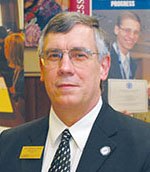A Partnership for the Future (Opinion)
by July 8, 2013 12:00 am 108 views

In December, McKinsey & Co. surveyed more than 8,000 employers, education providers and young people and found that 42 percent of employers believed new hires did not measure up in terms of skills, while 72 percent of universities believed they were producing skilled graduates.
Also, nearly 4 in 10 employers worldwide, and almost half of American employers who had vacancies, said the major reason for these vacancies was the lack of the right skills in new graduates.
Historically, business leaders have seen little need to become involved with business schools since many believe scholarship and education are mostly disconnected from the day-to-day realities of running the workplace.
The strongest criticisms are targeted at the sluggish pace of curricular and programmatic change, and the perceived slow response higher education in general has toward addressing pressing business concerns. Many of these complaints are justified.
From the academic side, business deans and faculty think business leaders do not fully understand what is actually taught in business schools, and we believe corporate executives often fail to see the long-term impact academic research has had and continues to have on improving the way businesses and markets operate.
Academics and business school faculty see their role as discovering and disseminating new ideas, creating and refining best practices and generating innovative ways of doing things. Business schools believe we are instrumental in transforming students into analytical problem solvers and effective employees through the engaged application of our content expertise and research findings in the classroom.
We believe we are producing qualified and capable graduates who should integrate seamlessly into the workplace.
Clearly, what is needed to address misunderstandings and misconceptions on both sides are more interaction and collaboration between the business community and business educators. Only through open and ongoing dialogue can business schools discover and focus on what skills employers are seeking, understand and measure how successfully our graduates are performing and develop and fine-tune the curricular and programmatic modifications needed to meet the demands of the current and future workplace.
As one example of partnering with the business community, the College of Business at the University of Arkansas at Fort Smith recently polled the 25 members of the Dean’s Leadership Council — an impressive group of community and business leaders in western Arkansas who serve as advocates for improving the quality of business education in the region — to better understand employers’ workforce concerns and needs.
As a result, UAFS will be starting a Distinction of Student Professional Development through the newly established Doug and Kathy Babb Student Professional Development Center.
Students who complete the 12-hour program will be more practiced in professional interactions, more polished, more connected to professionals, more confident and better prepared to join the workforce.
Of course, collaboration is two-way, so the business school has called on council members to help develop and expand our successful student-internship program.
Eighty-one percent of the council stated academic credentials and experience were equally important for recent college graduates seeking a position within their companies, and the College of Business has called upon these companies to help us provide the experience and skill set they are seeking in their new hires.
The College of Business also has called on council members to serve as mentors to our students to help them develop the leadership skills employers inform us they want.
Only by working collaboratively can business schools provide companies with the graduates they are seeking. Only by becoming engaged with business schools can corporate executives provide direction and feedback to continuously improve the quality of business education. And only by actually coming to campus and engaging students can business leaders play a role in transforming these bright, hard-working young people.
Dr. Steve Williams is dean and professor of management and Joel R. Stubblefield Endowed Chair of Business at the College of Business at the University of Arkansas at Fort Smith. He can be reached at 479-788-7807 or [email protected].
